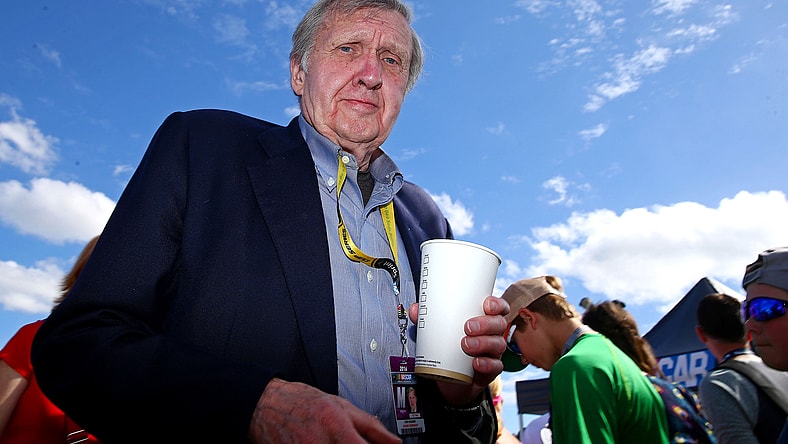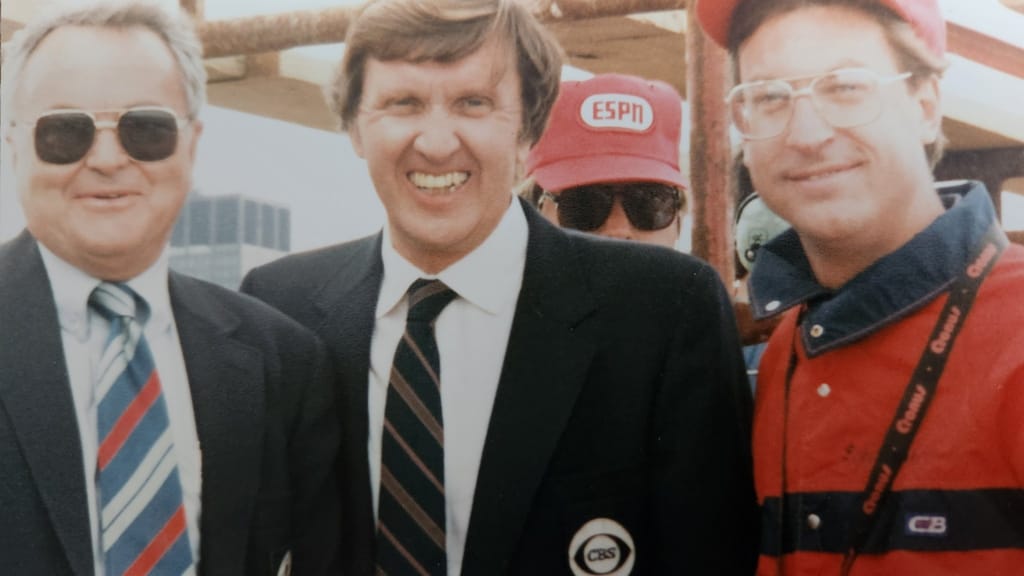
Ken Squier, the voice of a generation of NASCAR fans died on Wednesday night, at 88 years old.
Most famous for the call to the 1979 Daytona 500 and the subsequent fight between Bobby Allison, Donnie Allison and Cale Yarborough, Squier was instrumental in growing Cup Series racing in ways most casual fans do not realize too.
He co-founded the Motor Racing Network alongside NASCAR founder Bill France Sr. in 1970 and was also a major voice in convincing CBS executives to air the Great American Race in 1979 — largely considered the most important race in the history of the sport.
Squier served in a play-by-play capacity on CBS and TBS through 1997 and hosted pre and post-race through the 2000 season. He appeared in a guest role for Daytona Speedweeks coverage in the early days of NASCAR on FOX.
In recent years, starting with the 2015 season, he called a portion of the Southern 500 at Darlington when that event served as the official Cup Series throwback event.
There were no shortage of accolades offered his direction in the hours since his passing was made public.
NASCAR chairman Jim France:
“Though he never sat behind the wheel of a stock car, Ken Squier contributed to the growth of NASCAR as much as any competitor. Ken was a superb storyteller and his unmistakable voice is the soundtrack to many of NASCAR’s greatest moments. His calls on TV and radio brought fans closer to the sport, and for that he was a fan favorite. Ken knew no strangers, and he will be missed by all. On behalf of the France family and all of NASCAR, I offer my condolences to the family and friends of Ken Squier.”
NASCAR Hall of Fame executive director and longtime MRN broadcaster Winston Kelley:
“Ken’s contributions to and accomplishments in NASCAR are incalculable. The breadth and depth of his legacy cannot be overstated. Demonstrations of this range from co-founding Motor Racing Network with NASCAR Founder Bill France, Sr.; to convincing CBS executives to televise what became one of NASCAR’s most pivotal moments in the 1979 Daytona 500 as NASCAR’s first nationally-televised race flag-to-flag; to his iconic calls and commentary for more than seven decades on both radio and television; to being arguably the very best storyteller in our sport’s history to owning and promoting the renowned Thunder Road International Speedbowl in Vermont for 57 years. There is little in NASCAR that Ken Squier did not impact.
“While perhaps best known for his memorable last lap and postrace descriptions of the 1979 Daytona 500, he had the incomparable ability to so effectively articulate the human side of all NASCAR competitors. Among his signature phrases, used at just the right time, was ‘common men doing uncommon things,’ which helped audiences and we mere mortals understand the unique skills, risks and gravity of manhandling a 3,400-pound racecar at speeds in excess of 200 mph with 39 other snarling competitors entrenched around one another.”
A testament to the roles both men played in delivering the excitement of NASCAR to a national audience, NASCAR named its annual award for media excellence the Squier-Hall Award, which is presented every year as part of the NASCAR Hall of Fame ceremony.
Chris Economaki, Bob Jenkins and Dick Berggren are amongst the legends to have received that award.

Squier is also an inductee to the NASCAR Hall of Fame, humbly expressing in his speech in 2018 that he felt the competitors were the real legends and he was just able to tell their stories.
“I think we all call them heroes,” Squier said. “I’m feeling like an odd duck in a flock of fancy geese, let me tell you. The heroes in this room who learned their way through tenacity, courage and their ability to accomplish something they believe worthwhile. Vital. And now they’ve added a storyteller. Believe me I can tell some stories.”
His closing remarks on that speech contained the things he felt were most important for everyone to take away about his career and for anyone who cares about NASCAR and motorsports.
“I’m just very, very thankful to be here this evening to share my feelings about receiving this award and glad that you’re here to enjoy it and to consider it and think about what this sport means. What it really means to the American public.
“I hope that you’ll take that message along that this sport is so special, so unique and so beautiful in so many ways.”